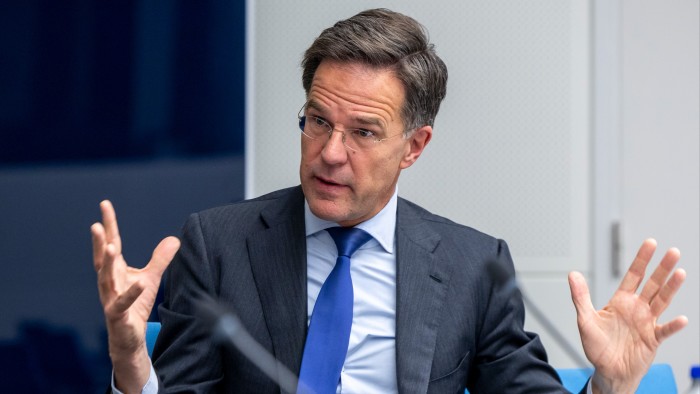Good morning. Nato’s new secretary-general Mark Rutte has revealed he told US president-elect Donald Trump that a bad peace deal for Ukraine would mean “high fives” between the leaders of Russia, China, Iran and North Korea, and that such an outcome posed a “dire threat” to the US.
Today, I have more from my interview with Rutte on how to best help Ukraine, and our Paris bureau chief explains the chaos in France.
A little less conversation
Nato leaders should focus all their efforts on sending more weapons to Ukraine so it can enter possible peace talks from a position of strength, and not spend the time “pondering” other initiatives, secretary-general Mark Rutte has said.
Context: Russia invaded Ukraine more than 1,000 days ago. Kyiv has fought back with the support of western weaponry. Future shipments from the US, the biggest single provider of arms, are in doubt after the election of Donald Trump as president.
Some European countries have publicly or privately floated ideas of sending troops to Ukraine, either as military trainers or to police a potential peace deal. Rutte reckons those discussions are a nice intellectual exercise, but Kyiv needs weapons, not ideas.
“I cannot, of course, force members to discuss anything or stop talking about anything,” he told the FT when asked about such proposals. “Talk about whatever you want to discuss. But the prime target we have is to make sure that [President Volodymyr] Zelenskyy can start those [peace] talks from a position of strength.”
“And that means that all the time [leaders] spend on pondering what could happen next, you are not spending in your cabinet, in your government meetings . . . making sure that you get as much of your military aid into Ukraine,” Rutte said in his first interview in the post. “So I’m not criticising them. I know they’re all politicians, this is part of the daily job. But I think that the core issue here is to make sure that we get to the military aid into Ukraine, that should be the main focus.”
Rutte will today chair a meeting of Nato foreign ministers that ends tomorrow. They will talk about Ukraine over dinner tonight, joined by their Ukrainian counterpart Andriy Sybiha, who has called for Kyiv to be offered a formal invitation to join the alliance.
Rutte acknowledged that the sequencing of potential peace talks and a Nato membership invitation “is something allies are clearly consulting each other about; what could be the best next step and how to work on this”.
“But what I always say to them when they ask me: I say, well, that’s all very fine and we need to have these debates, but for the immediate future, the most important thing is to get your military aid into Ukraine,” he added.
Chart du jour: Demographic decline
Since its peak of nearly 7mn births in the 1960s, the number of babies born in the EU has steadily dropped, falling to a record low last year. Click here for the full interactive chart.
On the brink
France is a political mess — again.
Prime Minister Michel Barnier’s government is on the verge of collapse after blinking during a high-stakes showdown with the far right over a belt-tightening draft budget, writes Leila Abboud.
Context: Installed as prime minister following snap elections in summer, Barnier has put forward a €60bn package of tax rises and spending cuts to plug France’s gaping budget hole. But his government lacks a majority in parliament, meaning he had to keep with Marine Le Pen’s far-right Rassemblement National and the leftwing Nouveau Front Populaire bloc onside.
Barnier, known as a skilled negotiator during the Brexit talks, yielded in the home stretch to several of Le Pen’s demands, only to balk at giving her the most costly one: scrapping a temporary freeze on pensions increases in line with inflation.
Instead, Barnier has chosen to try to strong-arm the National Assembly by using the 49.3 constitutional clause, which allows the government to pass a law without parliamentary approval, as long as it can then survive a no-confidence vote.
He appealed to lawmakers yesterday, saying that the country had arrived at a “moment of truth”, and it was up to them “to decide if our country gets a responsible, indispensable budget or if we step into uncharted territory”.
But few in France believe Barnier’s government can survive the vote, which will take place tomorrow.
If he falls, it will be up to President Emmanuel Macron to select a new prime minister who can survive longer than Barnier’s three months in office.
Macron’s last gamble in calling snap elections yielded a dysfunctional parliament. It remains to be seen what rabbit he will pull out of his hat this time.
What to watch today
-
Nato foreign ministers meet.
-
EU health ministers meet.
Now read these
Read the full article here

